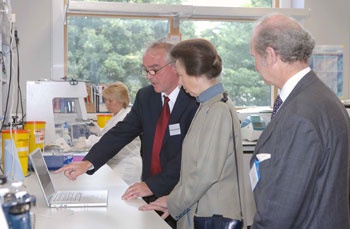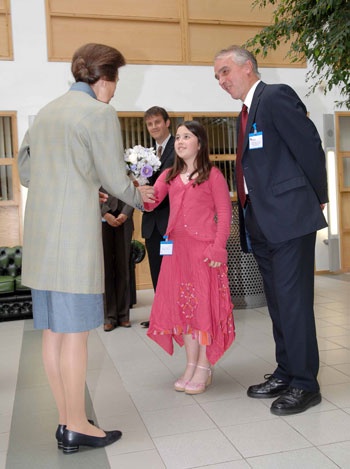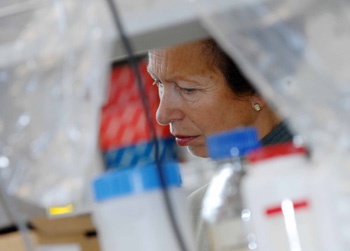Her Royal Highness The Princess Royal today (September 6) met with researchers and fundraisers associated with one of Scotland's most important medical research charities – Tenovus Scotland. The Grampian Committee of Tenovus Scotland has now provided funding of over £1 million for medical research in North East Scotland.
Set up in the 1970s to help initiate or pump-prime innovative ideas by local researchers, Tenovus Scotland has been funding over a dozen new projects every year at the University of Aberdeen, Rowett Research Institute and The Robert Gordon University.
The Princess Royal – who is Patron of Tenovus Scotland – visited the Institute of Medical Sciences (IMS) at the University of Aberdeen, where a number of the researchers are based.
Childhood asthma, bone diseases, coronary heart disease, sight loss, colorectal cancer, and renal failure are just some of the research areas that have been covered. Funding from Tenovus Scotland has helped to provide equipment and new technologies to assist a variety of different research projects. Often support from Tenovus Scotland has helped researchers to bring in other significant research funding from national or international bodies.
The Princess Royal saw at first hand equipment that Tenovus Scotland has assisted in funding. Dr Miep Helfrich, Mr Alastair McKinnon and Mr Kevin Mackenzie demonstrated the difference Tenovus Scotland has made to the imaging core facility in the IMS, which is used by biomedical researchers across the University and by staff of the NHS, by paying for equipment to facilitate image acquisition on high powered Electron Microscopes.
The digital cameras and imaging software have revolutionised electron microscope use. Her Royal Highness was shown examples of highly magnified bone cells, of renal biopsies and also close up views of the Scottish biting midge.

Head of Ophthalmology, Professor John Forrester, gave the Princess Royal a tour of the lab and explained about research being conducted into the sight threatening condition uveitis which affects many people worldwide.
He demonstrated a piece of high tech equipment called a flow cytometer which is used to examine cells in the blood which help researchers determine the most appropriate treatment.
The Professor also explained about the research being done into corneal grafts and why they are rejected in people who have suffered blindness due to infectious diseases.
The Royal Party will then be introduced to members of the Tenovus Scotland Grampian Committee who have been involved in the fundraising work and in the selection of the medical research projects.
She will meet Professor Nuala Booth, who was awarded the Sir Robin MacLellan Travel Award by Tenovus Scotland. Professor Booth is a world expert on factors affecting blood clots and how they are responsible for heart attacks and strokes. Her work has helped to understand how the body normally dissolves clots after they have healed wounds, and how this goes wrong in blood vessels, leading to sudden blockages in blood flow, causing heart attacks and strokes.
Her Royal Highness will be introduced to various groupings of researchers from the University of Aberdeen, the Rowett Research Institute, The Robert Gordon University and Aberdeen Royal Infirmary. Areas of research include Magnetic Resonance Imaging, childhood asthma , nutrition and trauma studies.
The Princess Royal will also meet some of the main funders and sponsors of Tenovus Scotland.

Dr David Galloway the Chairman of Tenovus Scotland Grampian, said: "The Grampian Committee is delighted to welcome our Royal Patron to meet with researchers in the North East for the first time.
"There has been so much exciting and innovative research work carried out here in Grampian, and Tenovus Scotland is proud to have been able to fund so many projects, many of which are now benefiting local people in diagnoses and treatments."
Professor Mike Greaves, Head of the University of Aberdeen's School of Medicine, said: "It is an absolute pleasure to welcome Her Royal Highness the Princess Royal to the University of Aberdeen which is extremely grateful to Tenovus Scotland for the longstanding support it has provided."
Professor Ian Booth, Director of the University of Aberdeen's Institute of Medical Sciences, added: "Tenovus Scotland is highly regarded by the University of Aberdeen because of the support the charity gives to our researchers who are investigating a wide range of key diseases such as bone disease, vascular disease, childhood asthma and eye disease. We are very pleased to be given the opportunity to tell the Royal Patron how the charity's investment is really money well spent."


